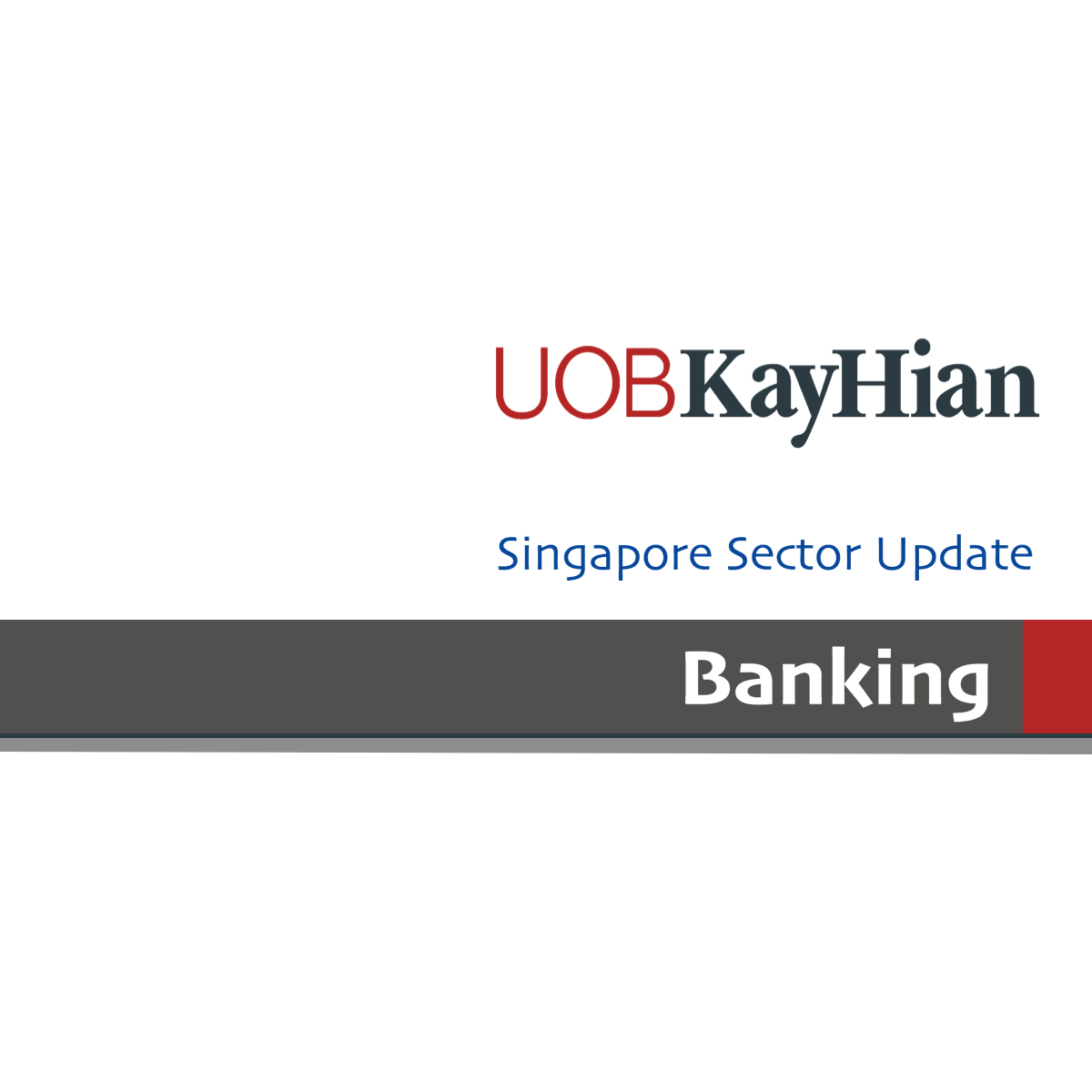 Singapore Banking Sector
Singapore Cryptocurrencies
DBS GROUP HOLDINGS LTD
D05.SI
OVERSEA-CHINESE BANKING CORP
O39.SI
UNITED OVERSEAS BANK LTD
U11.SI
Singapore Banking Sector
Singapore Cryptocurrencies
DBS GROUP HOLDINGS LTD
D05.SI
OVERSEA-CHINESE BANKING CORP
O39.SI
UNITED OVERSEAS BANK LTD
U11.SI
Banking – Singapore - Central Bank Cryptocurrencies
- Many complex questions are inadequately addressed and it is too premature for central banks to introduce retail central bank cryptocurrencies (CBCCs). On the other hand, central banks could introduce wholesale CBCCs, especially if existing wholesale payment systems are near-obsolescent.
- The MAS is conducting trials on wholesale CBCCs and clearing and settlement for government securities, which are practical areas where distributed ledger (blockchain) technology could be applied.
- Maintain OVERWEIGHT.
WHAT’S NEW
Cryptocurrencies depreciate the standing and effectiveness of central banks.
- The proliferation of cryptocurrencies will affect central banks’ ability to conduct effective monetary policy to stabilise growth in the economy and may even erode their status as lenders of last resort. The public may lose confidence in fiat currencies, which affects central banks’ control over money supply, interest rates and exchange rates.
Central banks could fight back with CBCCs.
- Central banks could create central bank cryptocurrencies (CBCCs) that are one-for-one convertible with cash and reserves.
- CBCCs are electronic central bank liabilities that can be used in decentralised peer-to-peer exchanges. CBCCs are centralised in supply but decentralised in transactions. They improve efficiency and reduce costs for payments, clearing and settlement.
- There are two forms of CBCCs:
a) Wholesale CBCC – A restricted-access, digital settlement token for wholesale payments between financial institutions.
- Implications:
- Many central banks are keen to replace their wholesale payment systems that are at the end of their technological life cycle and are costly to maintain. In Singapore, MEPS+ began operating in Dec 06 and there is no urgent need to replace a functional and modern wholesale payment system.
- Bank of England and Bank of Canada have concluded that distributed ledger technology is not yet mature enough for current adoption.
b) Retail CBCC – A consumer-facing payment instrument targeted at retail transactions for the general public.
- Implications:
- CBCCs will pave the way for the transition into a cashless society. Citizens no longer hold physical cash, ie bank notes and coins.
- Disintermediation could prove to be costly. The public “may” be allowed to have accounts with central banks to deposit their holdings of retail CBCCs, bypassing commercial banks which could be dis-intermediated. Banks have important responsibilities for liquidity and maturity transformation by channelling money from depositors to borrowers. Banks could lose their access to deposits and, in turn, reduce the provisions of loans to support growth in the real economy.
- Improves effectiveness of monetary policy. CBCCs remove the zero lower bound constraint for monetary policy. Unlike physical cash, it is technically feasible to pay interest, whether positive or negative, on CBCCs. If retail CBCCs were to completely replace physical cash, then it would no longer be possible for the general public to avoid negative interest rates. CBCC also speed up the transmission of changes in interest rates throughout the economy. Whether interest is paid on retail CBCCs would have differing implications on the effectiveness of monetary policy.
- Negative impact on financial stability. The general public could easily convert bank deposits into risk-free CBCCs, which affects liquidity and funding for commercial banks. Bank runs might occur more quickly as depositors do not need to queue at bank branches within opening hours.
Other outstanding issues:
- Scalability and efficiency. Most cryptocurrencies have limited scale compared to widely used retail payment systems. It remains to be seen whether CBCCs could process the huge number of daily transactions, given that they are resource intensive in terms of energy consumption and computing power.
- Security and cyber resiliency. Security breaches may undermine public confidence in CBCCs. However, distributed ledger provides greater resilience and data integrity compared with the traditional centralised clearing and settlement systems.
Applications in securities, commodities and derivatives transactions.
- Distributed ledger and blockchain technologies could streamline the clearing and settlement cycles, reducing middle and back office costs. It removes the reconciliation required across various independently managed ledgers, which introduces delays and increase operational costs. It makes real time clearing and settlement of transactions possible.
ACTION
Project Ubin: Singapore studying CBCC.
- The MAS is partnering R3, a blockchain-inspired fintech company, a consortium of banks (Bank of America Merrill Lynch, Credit Suisse, DBS, HSBC, JP Morgan, Mitsubishi UFJ, OCBC and UOB) and SGX to produce a proof-of-concept for interbank payments facilitated by distributed ledger technology.
- The aim of Project Ubin is to study the implication of tokenised form of the Singapore dollar on distributed ledger for interbank payments. Phase 1 of the project was conducted during Nov-Dec 16, which assessed the feasibility and implications of distributed ledger (blockchain) technology and identified areas for future enhancements. The next phase will explore improvements in domestic and cross-border securities transactions.
Potential changes in industry landscape for Singapore.
- The MAS recognises that banks need to be profitable to support growth in the real economy while unprofitable banks are a potential source of financial instability. Thus, the MAS is unlikely to pursue policies that undermine the strong positioning of Singapore banks.
- Judging from the on-going trials for Project Ubin, the MAS is looking at the implementation of distributed ledger (blockchain) technology for wholesale CBCCs and clearing and settlement for government securities. We believe there is no intention to introduce retail CBCCs due to the uncertain impact on monetary policy and financial stability. Applications to clearing and settlement for securities (equities and corporate bonds), commodities and derivatives could be explored at a later stage.

Jonathan Koh CFA
UOB Kay Hian
|
http://research.uobkayhian.com/
2017-11-27
UOB Kay Hian
SGX Stock
Analyst Report
26.100
Same
26.100
13.560
Same
13.560
99998.000
Same
99998.000

